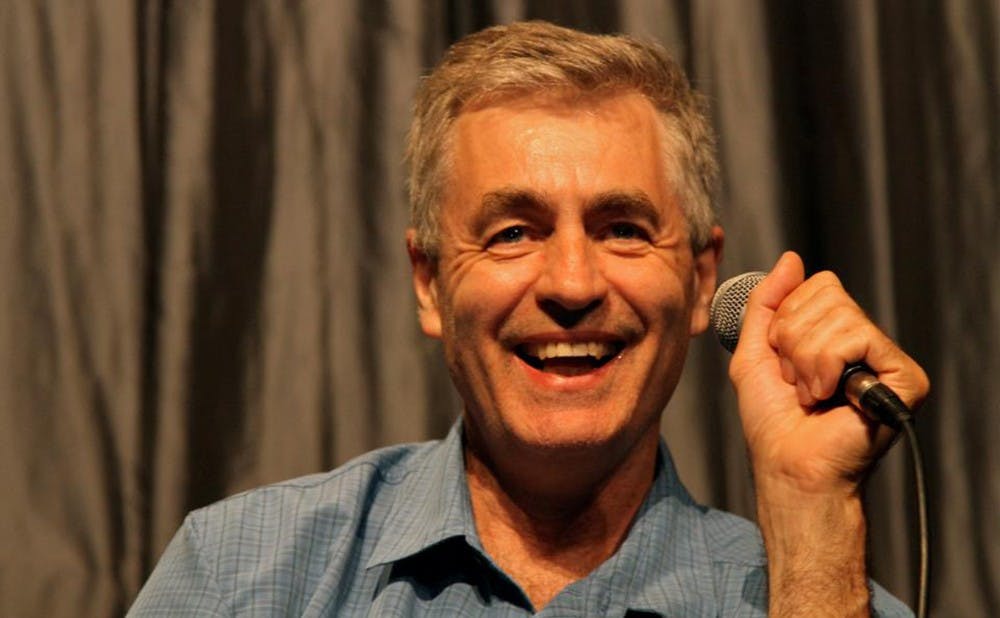This year, the Full Frame Documentary Film Festival is honoring Steve James with the Full Frame Tribute. Over the years, James has directed many popular documentaries, including “Hoop Dreams,” “Stevie” and “The Interrupters.” His work is often challenging but ultimately rewarding. James is personally a big fan of Full Frame; he claims that it is “one of the best documentary film festivals out there” and that he has attended “it numerous times over the years.” He specifically praised its smaller size, which makes it “filmmaker friendly.”
Like many, my first experience with the works of Steve James was his first film, “Hoop Dreams.” When I talked with Steve James this past week, he mentioned that he believes “Hoop Dreams” is the best place to start for those who have not seen any of his films. He claimed that the film is “the most representative of what I aspire to do in documentary: following stories of people who are not relatively well known,...capturing life as it unfolds” and creating an “intimate story with larger implications.”
Hoop Dreams focuses on two teenagers who come from poor neighborhoods in Chicago and dream of becoming professional basketball players. The movie chronicles the surprising twists of each boy’s basketball career but also follows their daily lives and the lives of their families. In his review of the film, Roger Ebert stated, “A film like 'Hoop Dreams' is what the movies are made for. It takes us, shakes us, and make us think in new ways about the world around us. It gives us the impression of having touched life itself.” Before watching the movie I was skeptical of these grandiose claims, but after three hours of laughing, crying, etc., I was sold. By the end of the film, it's clear that while mostly the high school basketball careers of the two main characters drove the plot (and the seemingly unbelievable plot twists), they were simply a vehicle to expose much deeper and poignant truths about poverty, family and sports complexes.
In “Hoop Dreams” and other James films, chance and coincidence play crucial roles. James mentioned that “we feel we have been very fortunate to have things just happen when we were there” and claimed that those moments where the unexpected happen are “the best moments in documentary filmmaking.” James stated that the key to being able to get these remarkable moments on film is “just putting in the time”—and that’s exactly what he does. "Hoop Dreams” was meant to be a quickly made 30 minute program, but slowly expanded to a three-hour-long feature that took five years to film. Another one of James's documentaries, “Stevie,” took over four years to film and is cited by James as the most challenging film he has made. The difficulty came not only from the amount of time the film took to make but also from the personal relationships the film featured; James had been a Big Brother to Stevie earlier in his life. Stevie was abused as a child and, soon after filming, gets into serious trouble with the law, leading to a complex documentary that forces the viewer to consider how to address individuals who are negative influences to society due to the fault of others.
What with the length of many of his documentaries, James develops close ties with his subjects. He claimed that he has often been able to “maintain good relations with the subjects” but that “there are some difficult moments,” which James mentioned often comes from the fact that “sometimes subjects have a different point of view than I do.” In his films, James hopes to “come to some point of view” that is present and not created or manipulated. In order to do so, he focuses on the complexity of situations and carefully follows and puts in the time to properly understand a situation. James mentioned that in his films, expressing that point of view is sometimes more important than complete objectivity. In the case of “Stevie,” where James has a personal connection and the situation is very emotional, there was “no way to be objective about it.”
His more recent film, “The Interrupters,” tracks the missions of individuals to stop violence in brutality-prone areas of Chicago. While documenting their work might put him in potentially dangerous situations, James mentioned that he never felt any real danger due to the fact that he was with “highly-regarded, highly-respected interrupters." Because he was focused on shooting, it pushed away “any concerns that might crop up.”
The Full Frame Documentary Film Festival will also be screening a double feature of “At The Death House Door,” about an executioner and the death penalty, and “A Place Called Pluto,” which deals with a man’s experience with Alzheimers. Also screening is “Reel Paradise,” about a couple who took an opportunity to program films for the world’s most remote movie theater. Commemorating the 20th anniversary of “Hoop Dreams” is the appropriately-titled special event, “Hoop Dreams at 20.” Many screenings of James’s films will have a Q&A afterward with the director and some of his subjects.
At Full Frame, James recommends “Happy Valley,” “The Great Invisible” and “The E-Team.
Get The Chronicle straight to your inbox
Signup for our weekly newsletter. Cancel at any time.

